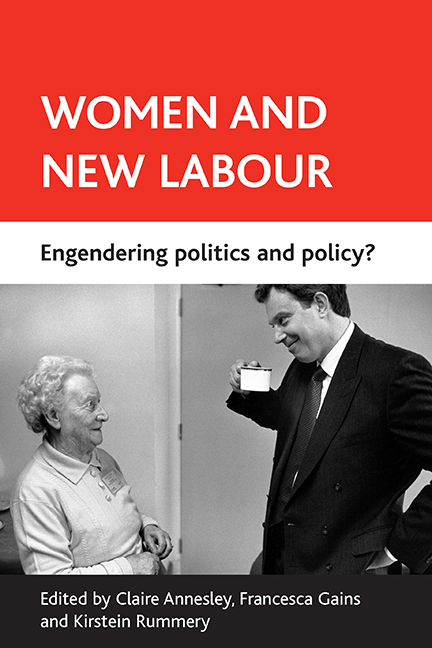ten - New Labour and ‘lesbian- and gay-friendly’ policy
Published online by Cambridge University Press: 15 September 2022
Summary
Introduction
This chapter considers a range of policies championed by New Labour which have made an impact on the lives of lesbian and gay citizens. The inclusion of this chapter in this collection may appear rather odd to some as it relates not just to ‘women’. Nevertheless, its placement here bares witness to the contested terrain of gender, sexuality and hetero-normativity and the impact of policies based upon stereotype and binary understandings of gender and sexual orientation. The level of cultural and political hostility toward lesbians and gay men prior to the election of New Labour and the overwhelming changes in policy since 1997 raises the question ‘Why is New Labour “lesbian- and gay-friendly”?’ The account below considers each policy in turn exploring the larger context of political culture, economic focus that underpinned the whirlwind ‘triumph’ of social justice.
Without a doubt, New Labour has been the most lesbian- and gay-friendly government in our history. Of course, such a statement must be understood in the historical context. For example, criminal law and public policy tended to be most concerned with the threat of male homosexuality to social morality (Weeks 1981, 85; Herman 1993, 253-4). Henry VIII in 1533 declared buggery with man, woman or beast a criminal offence punishable by death. In 1861 the death penalty was replaced by life imprisonment. In 1885, the Criminal Law Amendment Act made all male homosexual acts short of buggery, for example, kissing, oral sex, and mutual masturbation, committed in public or private illegal, labelling these ‘gross indecency’. This ‘blackmailer's charter’ resulted in a number of famous trials including that of Oscar Wilde and Sir John Gielgud. During the Second World War and the post-war period ‘gross indecency’ charges rose significantly and by 1955 over 2,322 men were arrested under this Act, many of whom were prominent public figures (Hyde 1970; Weeks 1990). The offence of ‘gross indecency’ remained on the statute books until the 2003 Sexual Offences Act.
The 1957 Wolfenden Report and subsequent 1967 Sexual Offences Act decriminalised homosexual acts in private between consenting men over 21 who were not members of the armed services. It did not, as popular opinion might suggest, ‘legalise’ homosexuality. Neither did it grant equality to homosexuals.
- Type
- Chapter
- Information
- Women and New LabourEngendering Politics and Policy?, pp. 193 - 210Publisher: Bristol University PressPrint publication year: 2007



